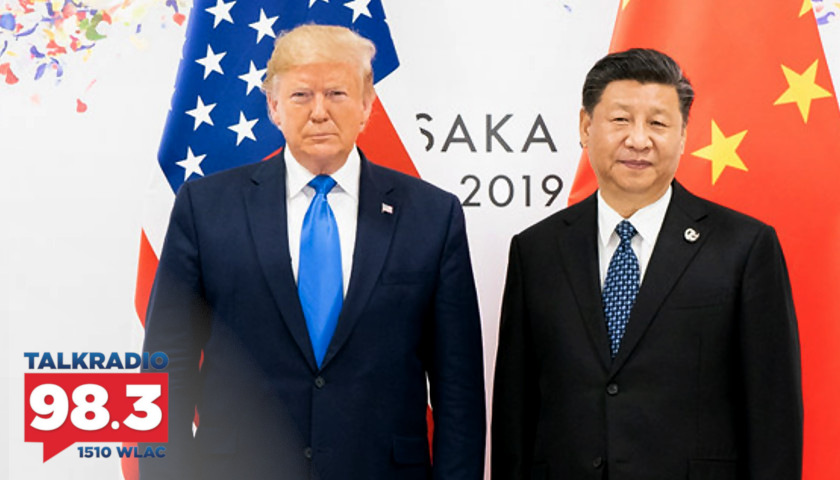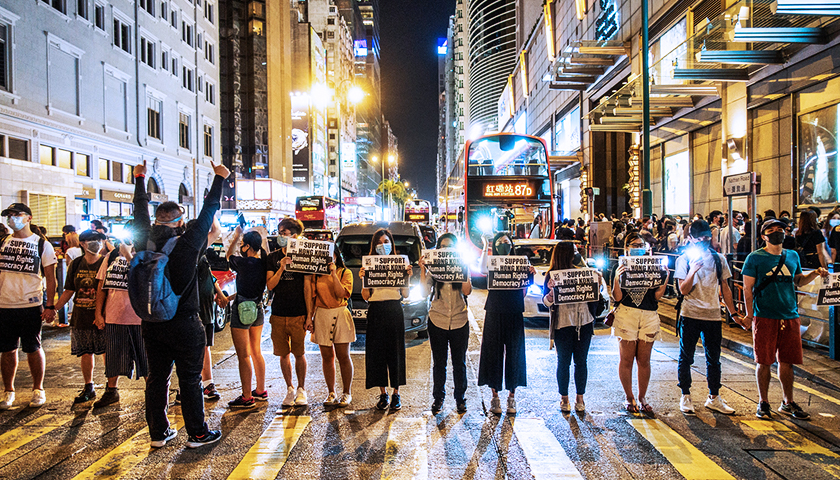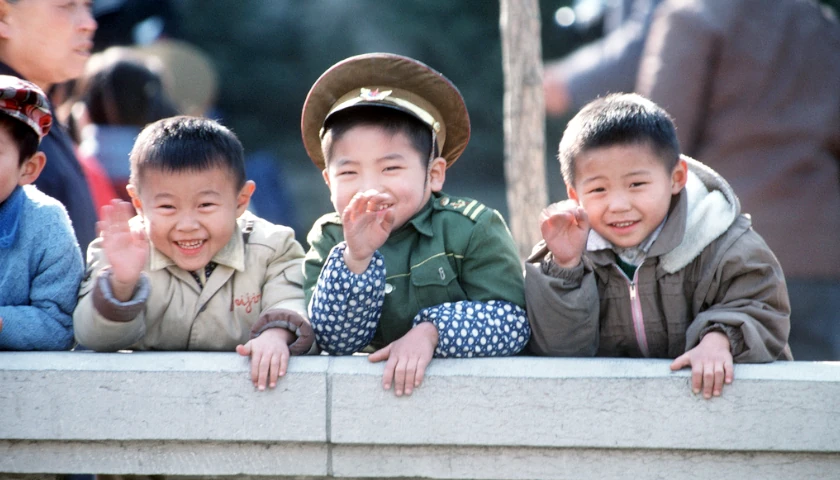Monday morning on The Tennessee Star Report with Michael Patrick Leahy – broadcast live from Music Row on Nashville’s Talk Radio 98.3 and 1510 WLAC weekdays from 5:00 a.m. to 8:00 a.m. – Leahy was joined on the newsmakers line by the original all-star panelist Crom Carmichael.
During the second hour, Carmichael discussed misconceptions of China as a country that would gravitate towards open markets and democracy because the United States had been assisting them to develop their economy. He questioned further whether or not the global community would place sanctions on China because of their negligence and lack of transparency in regards to the coronavirus.
Leahy: We are joined now by the original all-star panelist. Our good friend Crom Carmichael. Good morning Crom.
Carmichael: Michael, how are you, sir?
Leahy: I’m great. Did you shelter over the weekend, Crom?
Carmichael: Pretty much. Pretty much. Reading some books. I’m closing in on the end of The 100 Year Marathon by Michael Pillsbury. A very, very important book. A very important book.
Leahy: This is the guy I think you talked about this on Friday. This is the guy who for about 45 years was very much supportive of engaging with China. Over the past decade, he’s changed his mind. Tell us why.
Carmichael: Well for 35 years the thinking was that engagement with China and helping them build their economy would naturally move in the direction of free markets, rule of law, and democracy. Pillsbury has concluded that none of those three things are actually happening.
In fact, China is now without question our biggest adversary. Now that doesn’t mean that we are going to war. But they are our biggest adversary and we need to look at them as that and not as a country that is naturally evolving toward democracy. And the book is just a very very compelling book about why China is the way that it is.
Leahy: Now this book was published Crom before the pandemic correct?
Carmichael: Oh yes. Oh yes. It was published about three years ago.
Leahy: OK.
Carmichael: China, unlike the United States which in the world the United States is still a relatively new country. China has a five thousand-year history. And so its culture is one where it has always been ruled in one form or fashion, of course, it was ruled for centuries by various dynasties.
And then in 1948 the dynasty in the last century the dynasty’s was replaced by a communist government. And the government is still ruled by the communist party. And the thinking was that if you engaged with them that they’ll have to move towards free markets. Bloomberg showed quite frankly what a fool he is by saying that the premiere of China that he answers to a constituency.
Leahy: (Laughs) No, he doesn’t.
Carmichael: That’s just false. He doesn’t answer to a constituency unless its the hawks that run the communist Chinese party. It certainly isn’t the citizenry.
Leahy: You know Crom, it’s very interesting that you mention that because if you look at the idea of communism, marxism, in theory, it was, well the people would run everything. And yet, in practice, it appears in China the way it’s operating now its almost as if this is really just an extension of the dynastic control of a few elites who are smart and ruthless and greedy. That’s what it looks like to me.
Carmichael: Yeah. That’s accurate. I just encourage our listeners to read that book. It’s really an interesting book. You go back into the history of China to some extent about the war states and how the Chinese hawks think. And a great example is the way that they handled the pandemic when it was in Wuhan.
It could have been stopped there if the Chinese had been transparent. And so the question then becomes they knew they had it. They knew it was a problem and then they kept it a secret while millions of people went out around the world.
Leahy: Exactly.
Carmichael: You have to ask yourself at some point, was that purposeful? Or was it just that they were trying to keep it quiet and made a terrible mistake? The answer to that leads you in different directions for sure. It’s going to be interesting whether or not the world places a huge sanction and penalty on China for allowing this, and they did, they allowed this to happen by not telling the world about the problem.
Europe has not seen the peak of it. And we have not seen the peak of it. We will in the next it seems to me in the next 10 days we’ll see the peak of it here.
Leahy: Yes.
Carmichael: But then we’re going to have to make some choices which we can talk about in the next segment. At the end of April, we’re going to have to make some choices as to whether or not the country goes back to work.
I think a lot of things will change between now and the end of April the number of masks that are available and treatment options and things like that. Because the damage that’s being done to our economy is immense. And if you keep it going much past the end of April you move from immense to incalculable.
Leahy: Exactly.
Carmichael: So that will be a decision that will have to be made. You can already see the politicians lining up. I actually have a couple of suggestions to try to get the media thinking more clearly about what the options actually mean.
Leahy: And the problem a little bit in terms of the media is that many of them seem to be wanting to be apologists for the Chinese communist party. That is a big problem. I’ve seen that many times in recent days.
Carmichael: Well, it’s unsurprising. And then you see some members of the media who are literally trying to re-write history claiming that Trump knew about this in the fall and did nothing about it. And in fact, these organizations all have worldwide news operations and every one of them except Fox, every one of them condemned Trump when he put on travel restrictions from China on January 31st. Every one of them condemned him. Including Biden and all of the people in the media on the left. They condemned him as xenophobic.
Leahy: Yeah. Exactly. By the way Crom this model that we’ve been talking about the Institute for Health Metrics and Evaluation out of the University of Washington funded by the Bill and Melinda Gates Foundation. They have downgraded their projections of US deaths which have been 93,000 yesterday.
Now it’s down to 81,000. And in part Crom that’s because the actual number of deaths and the actual number of hospitalizations appears to be significantly lower than they projected. Here in Tennessee, this same model had projected as of yesterday was projecting we’d have 3,400 deaths by August fourth. Now this morning, it’s down to 587.
Carmichael: That’s good. And I suppose that the reason for that is that the Trump administration has done such a good job working with the governors to reduce the spread of the pandemic. The data is the data as they say.
And it means that they were operating on data that showed a much bigger spread than turned out to be the case. And that was based on early data. So we have to give benefits and kudos to where it’s deserved and that would be Trump and the governors.
Leahy: You know talking about the governors I’ll just throw this out. We’ve been tracking with our Tennessee Star, The Ohio Star, The Michigan Star and the Minnesota Sun we’ve been tracking Mike DeWine in Ohio and he and his health director about a week ago who put forth projections with data nobody knew about which claimed that on the peak data of August 19th they have 10,000 new cases a day of coronavirus.
The only problem with that Crom is that it’s way way off. And Ohio, because they put all these stay at home requirements in much much earlier has had huge unemployment problems. One of the things that some of the governors are going to have to look at is that if they made these projections based on scientifically fraudulent data what sort of liability are they going to have? What do you think of that?
Carmichael: Well, you’d have to know that the data was fraudulent and I think that early on in anything you can find projections that will suit a conclusion. But I’m not going to be in the Democrat camp of trying to lay the blame of defeat on a politician for if they did something in the extreme to try to lock down the pandemic early on.
Leahy: If they did it in good faith I guess is the question on that.
Listen to the full second hour here:
– – –
Tune in weekdays from 5:00 – 8:00 a.m. to the Tennessee Star Report with Michael Patrick Leahy on Talk Radio 98.3 FM WLAC 1510. Listen online at iHeart Radio.






Nobody ever called Mainland China a democracy. That, however, does not mean we should go to war with her. Remember what happened to us when we tried that in 1950 in our first Vietnam-like quagmire on the Korean Peninsula. We need to cooperate with them while simultaneously protecting our interests. The saber-rattlers in this country are not the ones who are putting their lives on the line in any conflict with China.
William, you need to work on your reading comprehension skills. Nobody has suggested we go to war with China. But there is a lot of room in between going to war and the current state of ass-kissing because our supply chains are so utterly dependent on China.
You’re using the tried-and-true leftist tactic of lying about what someone said and then attacking them for saying something they never said. Are you fundamentally dishonest or just too drunk on the kool-aid to see how absurd your position is?